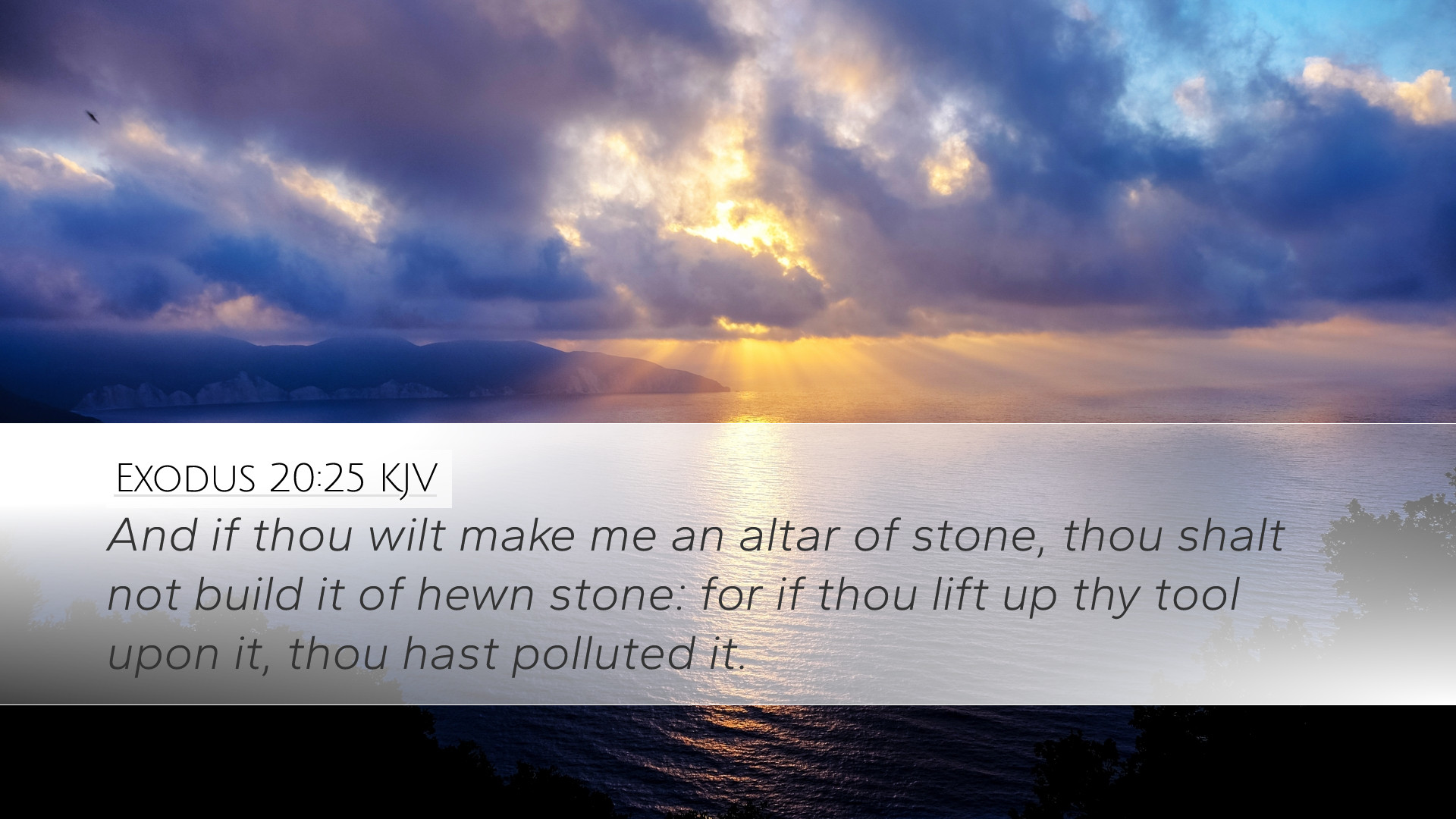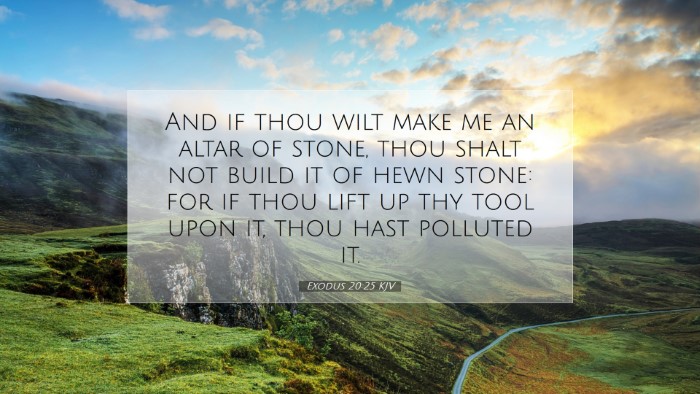Exodus 20:25 Commentary
Verse: "And if thou wilt make me an altar of stone, thou shalt not build it of hewn stone: for if thou lift up thy tool upon it, thou hast polluted it." (Exodus 20:25 KJV)
Contextual Background
Exodus 20 contains the Ten Commandments, a foundational element of Israelite law and morality. Following the establishment of these commandments, God provides additional instructions concerning worship, particularly regarding altars.
The Importance of Altar Construction
The instructions for creating an altar reveal God's desire for purity and simplicity in worship. The altar serves not only as a physical structure but as a symbol of the relationship between God and His people. An altar in ancient Israel was a place of sacrifice, and thus, its construction held significant theological implications.
Insights from Matthew Henry
Matthew Henry emphasizes that God desires an altar that is naturally formed rather than one that is crafted by human hands. He interprets this requirement as illustrating two significant themes: divine sovereignty and the humility of human effort.
- Divine Sovereignty: The use of unhewn stones reflects the idea that worship should be grounded in God’s creation and not in human ingenuity or artistry. It signifies that what pleases God cannot be achieved through human effort, but through a return to simplicity and divine design.
- Humility of Human Effort: By prohibiting the use of tools, God reinforces the notion that worship is not about human contributions but rather about recognizing and honoring the Creator with what He has provided.
Albert Barnes' Analysis
Albert Barnes provides a thorough examination of the phrase "if thou lift up thy tool upon it, thou hast polluted it." He highlights that the tools of man are associated with defilement, especially in the context of sacred spaces:
- Theological Implication: The act of lifting a tool signifies the introduction of human craftsmanship into the divine design. This statement challenges the idea that human effort can enhance what is already holy.
- Symbol of Purity: The altar made from unhewn stones is a metaphor for purity. It holds that the altar must remain untouched by human hands—reflecting the concept that worship must originate from the heart rather than external requirements.
Adam Clarke's Interpretation
Adam Clarke adds depth to the discussion by providing insight into the cultural and historical context of the altar. He comments on the practice of making altars among other ancient cultures, and how God differentiates the Israelite practice:
- Contrast with Pagan Practices: Other nations often embellished their altars with intricate designs, signifying their reliance on human artistry to connect with their deities. In contrast, the command for simple stone altars marked a separation of the Israelites' worship from those practices.
- Laws of Consecration: Clarke connects this prohibition with broader biblical themes of consecration, placing importance on the manner in which worship is carried out as an integral part of one's fidelity to God.
Application and Theological Reflection
The instructions in Exodus 20:25 serve as a compelling reminder to pastors, theologians, and students of scripture about the essence of worship. Here are some reflections on its application:
- Simplicity in Worship: The desire for unhewn stones suggests that simplicity and authenticity are crucial for genuine worship. Worship leaders and congregants are called to focus on the heart's posture rather than an elaborate external display.
- God's Creative Authority: In recognizing God's authority in the creation of the altar, believers are reminded of their reliance on divine grace rather than human achievement. This concept can have profound implications for theology, particularly in understanding grace and works.
- Contrasting Cultural Worship: The necessity for uncut stones reflects a rejection of contemporary practices that seek human enhancement in worship. Churches today can learn from this example to resist trends that stray from biblical foundations.
Conclusion
Exodus 20:25 provides invaluable insights into the nature of worship and the character of divine instruction. Through the lenses of Matthew Henry, Albert Barnes, and Adam Clarke, this verse transforms into a profound theological statement on simplicity, purity, and fidelity in worship. By focusing on what God deems acceptable, believers can cultivate a richer, more meaningful relationship with the Creator.


